
Tell us about Aunt Ethel’s Pot Pies. How did it all come about?
Sasha Millstein: Aunt Ethel’s Pot Pies was born February. My aunt and I were on vacation in Vietnam, on the beach. We were talking about her company. She’s been a caterer in New York City for the last thirty years selling retail products. So, I just asked her what her most popular product was.
When she mentioned the pot pie to me, I kind of thought about it and I realized: “The pot pie is the great common denominator of mankind.“
No matter if you’re blue collar, white collar, Republican, Democrat, black, white, everybody loves a pot pie and it brings everybody together. Especially in this divided country. And so, I decided to start a company based on her pot pie recipe with the purpose of democratizing it. Up until then, she had been selling it to high-networth clients for about 25 USD each. I scaled it back to offer it to hundreds of millions of people who didn’t have access to it.
When we started to look at the pot pie industry, we realized there were two major pain points. One of them was that the crust on the bottom and the sides always seemed to get soggy and overcooked. The other major pain point is that it usually took another 45 or 60 minutes to heat up in the oven. And if we wanted to turn this product into a fast food option, we had to spend a few months of R&D to figure out how to produce the highest quality pot-pie with the crispy, flaky crust and hot piping filling.
Thus, we came up with this innovative concept where we separated the crust from the filling. We were inspired by the yogurt bowls whereby the granola is on the top and separated from the yogurt as a whole. We deviced this innovative packaging where the crust was separated from the filling. You could place the crust in the toaster for 30 seconds and take the bowl with the filling in it and place it in the microwave for 3-4 minutes. And then place the crust back on the bowl and dig in!
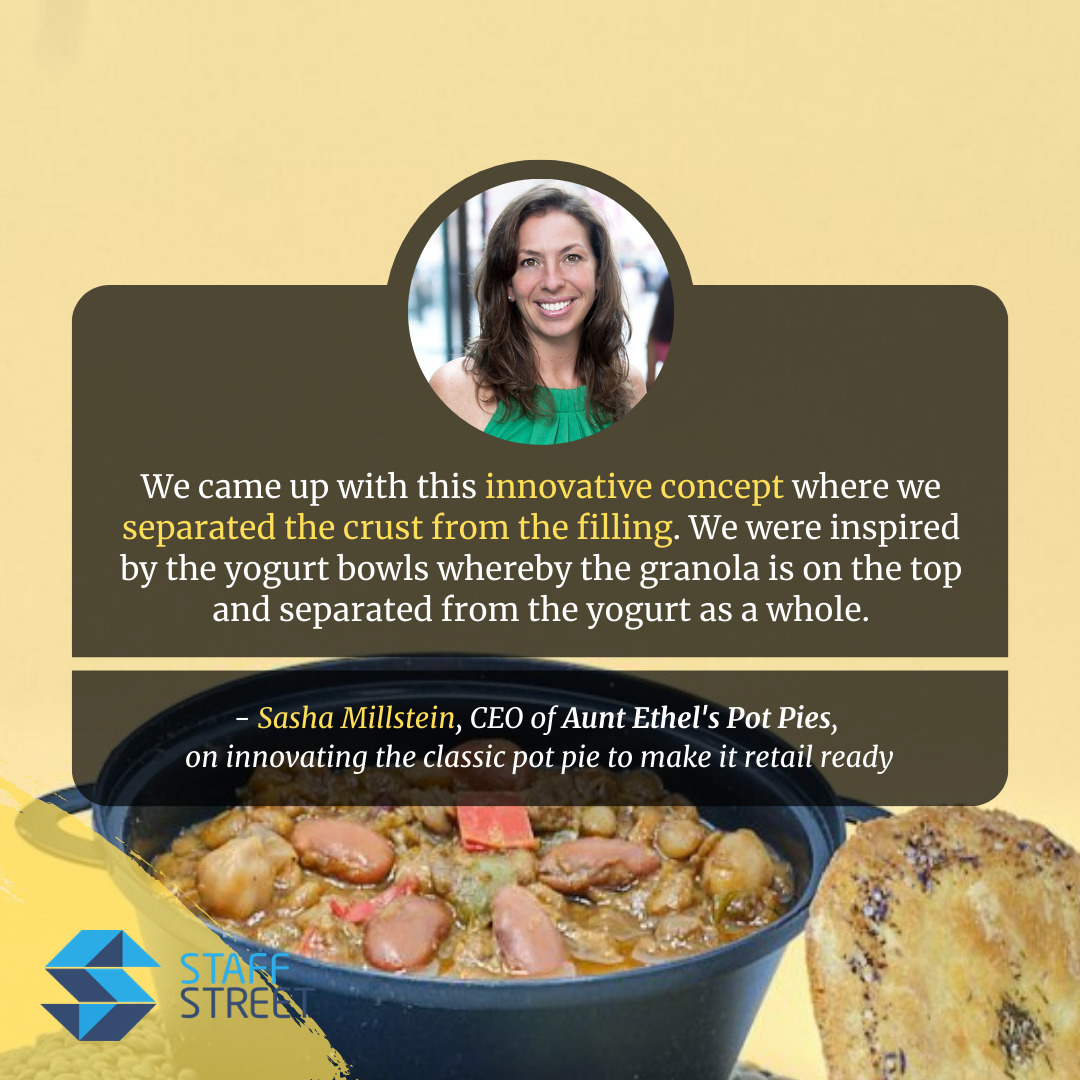
That’s how we were able to prepare Aunt Ethel’s Pot Pies under 5 minutes and come out tasting like you’ve spent baking it in the kitchen all day. That’s the concept and the product. We’ve been working on scaling it up and getting it up on the shelf.
How did you decide on making Aunt Ethel’s standout this way?
When we did market research, we would always ask two questions. One is, “Do you like pot pies“? Everybody unanimously would say yes. Secondly, we’d ask, “When was the last time you had pot pie?” Everybody would say, it’s been a while. After trying what the markets had on offer, we realized that the product itself is a really great product. Just executed really poorly.
In making it easy-to-make and still delicious and healthy, were you hoping to reach a specific set of customers, like busy day employees, for example?
I see our target market is in two different areas.
One is with the people who are working from home. When you’re working from home, strangely enough, you don’t necessarily have an hour or two to take off for lunch. We’re trying to provide a product that you can make in under 5 minutes. One that is clean-labeled and nutritional. Our product is hormone-free, antibiotic-free, organic. Our chicken is slow-roasted, hand-pulled, with no preservatives or added chemicals. You feel even more productive after eating it as opposed to lethargic or sleepy.
The other target market that is near and dear to my heart is with kids. I remember coming home from school everyday and I remember eating bagel bites, bagel dogs, and top ramen. Looking back, I realize none of those things are really nutritional. But they were food I could prepare in five minutes before I had to change to go to softball practice or track or whatever it was.
So, this is a product for kids to be able to prepare on their own, especially if they’re at home and they’re doing home-schooling. It’s something they can prepare where they feel like they’re cooking a little bit, and they can also feel good about making.
You said that your aunt’s consumer base was much more limited. How did you start the process of making Aunt Ethel’s Pot Pies much more accessible?
We transitioned into a much larger and industrial kitchen. She had been working in a very small space here in Staten Island. We also devised this new packaging and design. Then, we hired a few line cooks to streamline the process. We also converted the recipe to make it more commercially viable. We wanted to make sure we could batch it up at a large level but still taste hand-crafted.
Did you find these transitions particularly challenging this year?
Frankly, we’re still in the midst of working out those kinks. I just hired a production manager a few weeks ago. We’re still in the middle of transitioning into those kitchens and batching the products. We want to really work out the kinks before launching full scale in January.
Did you find it challenge to work with different people this year?
In my experience, I would say that people are more accessible. I’ve hired two different people.
Firstly, we hired a recipe formulator who batched the recipes and tweaked them to make sure they’re nutritionally viable. He’s opened up a number of restaurants and he’s a very well known Michelin star chef. I don’t think that we would have had the opportunity to work with him, had the recession not interrupted the restaurant business.
We’ve also hired a production manager. She has been working for catering companies in the past. Since the catering businesses have been suspended, we were able to bring her on board to manage and run the manufacturing side of the business.
Were there other surprising opportunities or lessons that you encountered during this strange pandemic year?
We kind of fell into a special place. We had our first pop-up on March 5th of this year and we sold out. For every Aunt Ethel’s Pot Pie that people ate in-store, they took home between 5 to 7 to-go. We realized right at that point that this was a retail item as opposed to a brick-and-mortar. We had debated whether or not to start opening up a line of brick-and-mortar stores, or go down the retail route. So, that epiphany was one of the silver linings of the pop-up.
At the same time, our first customer was a cafe. We had our first order on March 10 and she went out of business March 20. We had to put a pause on our sort of business model in terms of sales challenge. Bars and cafes were closing down, everybody was putting a moratorium on sales or bringing on any new products. What it did is allow me to go back to the drawing board. You can’t only rely on cafes or restaurants. It’s important to have an omnichannel strategy to be able to sustain the ebb and flow of the CPG industry. You can’t only rely on retail and grocery stores or direct-to-consumers. All of these things pivot.
All in all, I’d say we were actually lucky. One of the biggest lessons from starting out in March is that we’d been given a handbook based on this chaotic time, and we think that that is normal. Even though it was completely out of the realm for most companies. Tobias Lütke, the CEO of Shopify, said: “There is no better time to start a company than when nobody’s watching you.”
The fact that I could access CEOs, Executives and Founders, who were all working from home through Zoom was hugely beneficial. It helped me understand the CPG industry better, everything that they did wrong, everything they did right, and everything they wish they would have known. I was able to access this brand new set of rules I wouldn’t have known about otherwise about and use them as my norm.
Did you also find any surprising paths to your customers?
Back in June or July, the state of New York implemented a new law. For every alcoholic beverage that you order in a bar, you are required to serve food with that. All of a sudden, bars needed something that they were able to prepare quickly, that they didn’t need a lot of equipment for, that they would be able to serve. We quickly pivoted and partnered up with a lot of these bars. Aunt Ethel’s Pot Pies has a shelf-life of a year and they could prepare it under 5 minutes in a microwave or a toaster.
Speaking of reaching out to your consumers, do you have specific strategies to ensure customer satisfaction?
Listen, listen, listen. I mean, in this day and age, when we couldn’t really do demos, I constantly went to the bars myself to watch the people, to see how they eat it and how much they eat, and to ask them what they liked about it, what they didn’t like, would they buy this again, how often they would buy it, etc.
It helped improve our Lentil Chili Pot Pie. People have said that they love it, but they could also see it having tortilla strips instead of pot pie crusts. And that’s generally my strategy: going back to the drawing table and pivoting and tweaking the product to make it more in-line with the kind of feedback that we’re getting.
Do you use social media to communicate with your customers as well?
Our social media is really green right now. That’s definitely one of the areas that we want to improve on. I actually just hired a social media manager about a week ago, so we’re still brainstorming which direction we want to go.
We really want to build a community of engagement where people feel like their opinions matter, that we listen to them, and that we tweak our products based on what they have to say or what they’re looking for.
You can only create a product based on what you think you know. You really have to start listening to other people to really figure out what people out there want because I realized that after all these years, buying products and seeing products, you won’t really know what the rest of the country wants until you ask.
Is it easy to manage communications and streamline your work when you deal with so many people outside of your own organization?
Organization is key. What my aunt likes to tell me is that the only thing you have is time on your side and you have to be able to leverage that as much as possible. But I also like to think it’s working with the right people.
I’ve come to realize when you build a company, it isn’t necessarily about a product. It’s about building relationships. Working with people to createt this output. While the product is essential, what’s more important is creating these relationships in order to build the business and really push the company forward. I couldn’t do what I did unless I hired really good people who are really effective at their jobs.
If you had a magic wand and you can magic anything about your business, what would it be?
Like, cloning myself? Like a hundred of me to be everywhere at once. (laughs)
Where do you see Aunt Ethe’s Pot Pies in a year’s time?
In the next few months, we’re going to partner up with a frozen food delivery start-up to reach out and expand our deliveries to the Brooklyn area.
We cross-market with a company here in New York called Dufour Pastry, which provides us with our puff pastry. And currently, they’re being nationally sold in major retailers and boutique retailers. We sort of have a road paved for us in the sense that part of our products, or one of the major components of our product is already available and established in retail stores across the country.
So, in a year, I would like to see Aunt Ethel’s Pot Pies become part of many, if not most, of the major retailers here in the New York Market and possibly in the Tri-State Area.
We are also working to partner up with at least half a dozen cafes in order to proof our concept. Our product is an excellent fit for Starbucks. Over the next year, we are going to proof that concept to make sure that it is a viable product. We’d like to fill cafes before we reach out to Howard Schultz.
Is there anything else you’d like to achieve with Aunt Ethel’s Pot Pies?
I’ve been doing angel investing with 37 Angels for the past five years. I have a background in finance and sales and marketing.
My 20-year plan is to have an exit, and to build a microfinancing organization and to travel around the world investing in women who haven’t had the same resources and opportunities that we’ve had. That’s the whole purpose of the company. You know you have to have purpose. You can’t just be “about the bottom line“. I want to personally believe that we’re building this company for a much larger process.
You know, there’s this statistic that says anything above 70,000 dollars is not going to augment your happiness. You have to figure out some way of giving back or you’re never going to be happy.
What are the ways that you’re integrating this philosophy in your business practice?
When I hired my production manager and told my aunt about it, she turned to me and said, “That’s it. That’s how we’re going to build this.”
Between my aunt and I, we want to build an entire manufacturing organization that’s completely female-focused. Women have a tendency to be more detail-oriented, better at tasking, better at caring about the product and respecting it.
Also, when I was doing microfinancing years ago, just the knowledge that the financial systems are not necessarily geared towards women is mindboggling. Because when you look at the numbers, women are statsitically more likely to pay back loans, to save face, to follow through, to not default on their responsibilities. Philosophically, it just makes a lot more sense.
It’s important to invest in what is viable. Women are not receiving the bulk of the capital out there doled out by venture capitalists. And yet, they have a much higher rate of success when you look at the female-founded companies. They’re succeeding way more than male-founded companies.
Philosophically, socially, financially, it all makes so much more business sense to incorporate that into how we’re building up Aunt Ethel’s Pot Pies.

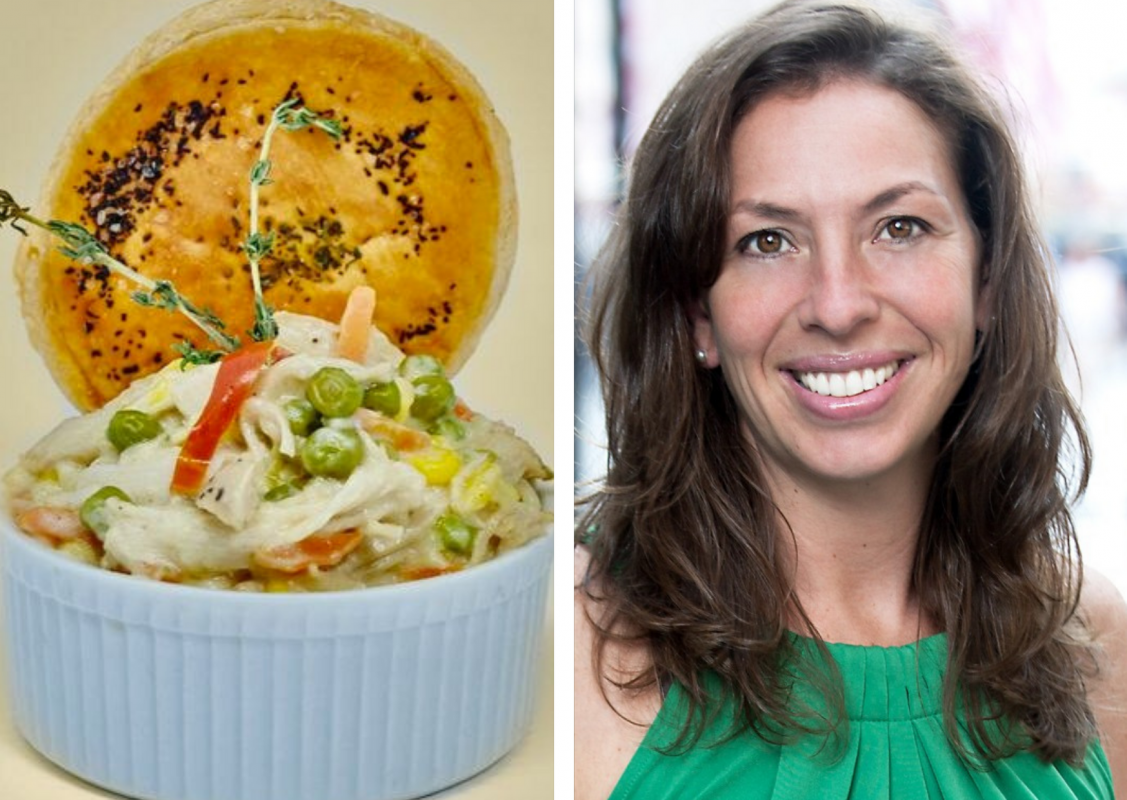

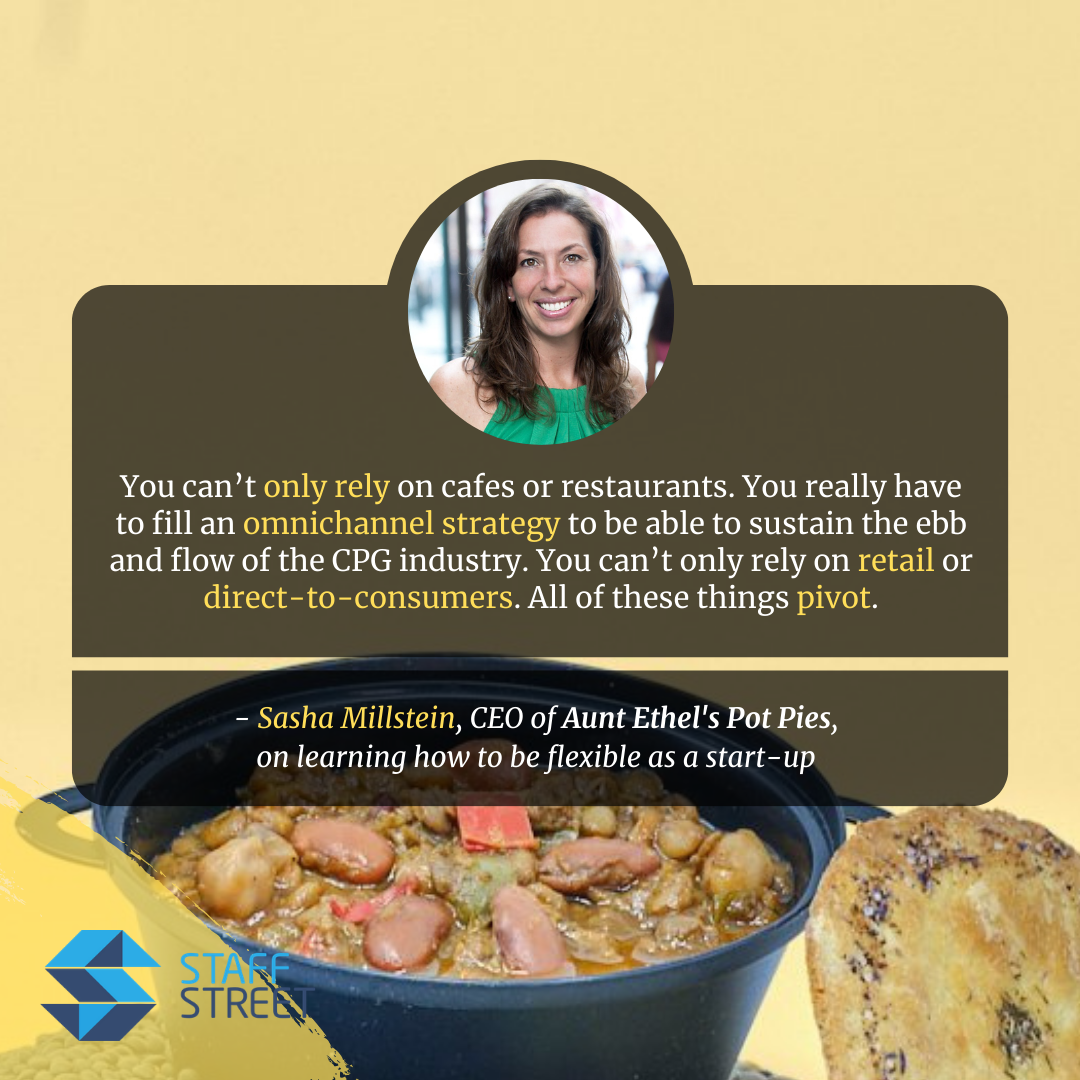
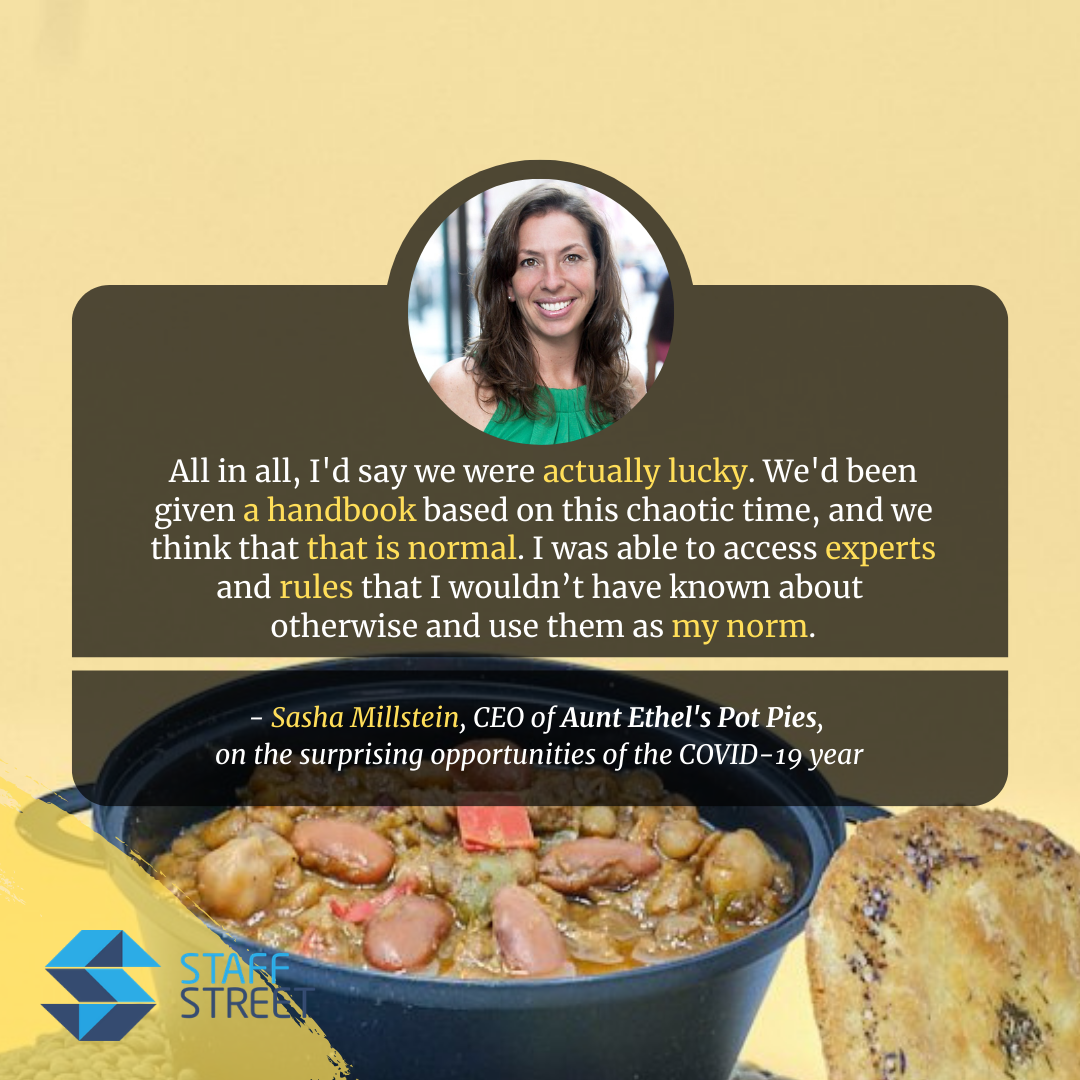



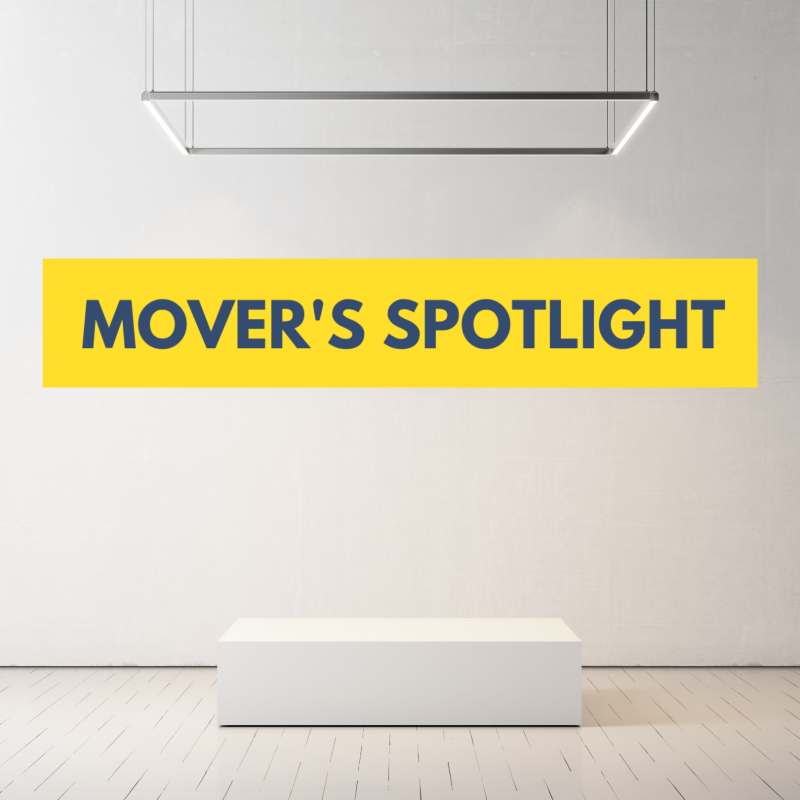

Pingback: Four Important Ways to Make Customer Service More Responsive - Staff Street
Pingback: 4 Things Entrepreneurs Wish They Did Differently and 1 Thing They're Happy They Did - Staff Street